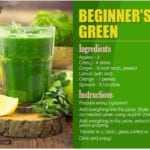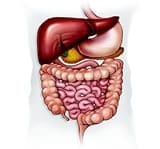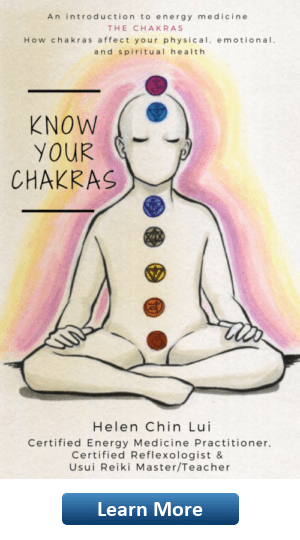Many of us go through life with symptoms that we view as everyday ailments – indeed, everything from abdominal pains, irregularity and bloating is often considered ‘normal’, when it is in fact a sign of poor digestion. However, by making just a few small changes to our daily life patterns and habits, we can help kick our guts into gear to ensure they successfully digest like they were designed to do.
We are essentially one long tube (25-30 foot to be exact) from mouth to anus, and the mucous membrane that lines the gut is our primary interface between the external environment and our body’s internal environment. This mucosal barrier is our first line of defense against pathogens and is designed to allow beneficial things into the circulation and keep the bad guys out – this is one of its most important functions and it comprises around 75-80% of our entire immune system.
“Therefore, how well our digestive system functions will really determine our overall health. When the gut is damaged, all sorts of health problems start to happen – from depression and mental health problems, to auto immune diseases, food allergies and even seasonal allergies.”
1. AVOID EATING WHEN YOU ARE STRESSED OR EMOTIONAL
When we are stressed, our bodies go into ‘fight or flight’ mode when the sympathetic nervous system is dominant. This means the body will shut down digestion in order to divert energy to the brain and muscles in order to respond to the stressful situation. After all, why would you need to digest your lunch when you are ‘fleeing the sabre tooth tiger’.”
Some simple breathing techniques can be an effective way to combat this. “When we’re anxious or stressed out we tend to breathe through our mouths, which activates our sympathetic nervous system. Breathing through the nose does the opposite and puts us in parasympathetic (rest and digest) mode. So, try closing your eyes and taking three deep breaths in and out through the nose before eating.
2. TAKE TIME TO EAT
Digestion begins well before you actually put food in your mouth. The sight and smell of food will start the digestive process by the production of digestive enzymes in the mouth (the saying “mouth watering” really does ring true).
Think about the food, notice how it looks and smells on the plate. Avoid mindless eating and take time to sit down to eat – don’t have a meal on the run, or while watching TV or sitting at your desk. Sitting down is all you should be doing as your body needs to be in parasympathetic mode (our rest and digest mode) to allow for optimal digestion.
3. CHEW YOUR FOOD
Yes, you heard right – just this simple trick can make your food go down smoother and faster. This is a simple tip, but one that so many people overlook. Digestive enzymes are secreted in the mouth by your salivary glands and work to start to breaking down food, especially starches (if you chew a piece of bread really well you begin to taste it becoming sweeter, due to the salivary enzymes starting to break down the starch into glucose).
The physical action of chewing also breaks down the food so that it’s ready to enter the stomach. Try chewing at least 20 times before swallowing each mouthful.
4. AVOID DRINKING WITH YOUR MEALS
Drinking liquids can dilute the body’s digestive enzymes and stomach acid. If you are chewing properly this should provide enough saliva to allow you to eat and swallow comfortably.
5. START THE DAY WITH A DETOXING DRINK
First thing in the morning a glass of warm water and lemon can help kick start the digestion, flush out toxins and put your bowels onto the right track. If you particularly suffer from reflux or bloating, try taking organic apple cider vinegar before meals to help stimulate digestion. Put 1/2 teaspoon in a small amount of water, swish and swallow before meals.
6. EAT REAL FOOD AND DRINK
Really, it’s not rocket science – just eat real food. Avoid foods that harm the gut and cut out all processed, packaged, refined products and sugar as these can all can cause undesirable changes in the beneficial gut flora and may disrupt the integrity of the gut’s mucosal barrier.
Excess alcohol has also been shown to cause increased permeability of the gut lining. So, If you suffer from severe gut issues, then elimination is recommended.
7. INCLUDE FERMENTED FOODS
Top 3 super foods are fermented foods. The fermentation process has been shown to make the food more digestible and will introduce beneficial bacteria (also known as probiotics) into the digestive system. Probiotics have been shown to help improve bowel health, aid digestion and improve immunity.
Great fermented options for the gut; fermented raw vegetables such as sauerkraut and kimchi, fermented dairy such as kefir and yoghurt and fermented drinks such as kombucha, beetroot kvaas and water kefir.
8. HEAL THE GUT WITH A GOOD BONE BROTH
Homemade bone broth (or stock) made from water and the bones of animals (simmered for 12-24 hours) is another of my top 3 super foods. It’s considered a healing food in many traditional cultures and is rich in glycine, L-glutamine, collagen and gelatin which support digestion, heal the gut lining and can reduce intestinal inflammation. Drink a cup a day and use as a base in home made soups, sauces and stews.
9. ABIDE BY THE 10 MINUTE MANTRA
It’s not a sprint, it’s a marathon! So take your time and don’t wolf down your food. “Allow time to finish before going for seconds; It takes ten minutes for the message to get from the stomach to the brain that it’s full. So, try to wait at least ten minutes before having a second helping – this will stop you from overeating, which can be a common cause of indigestion.
10. EXERCISE
Go for a short walk after your meal. Exercise can improve blood flow through the body and helps with peristalsis -the wave like contractions which move digested food along the gut.
It is important that if you have any unexplained symptoms such as abdominal bloating or abdominal pain you should first seek medical advice from your doctor or health care provider.
Article written by – Nutritional Therapist Helen Williams
—————
If you would like to explore how reflexology can help you with your abdominal pain, please schedule a free consultation with the HealingPlaceMed by calling 508 359-6463.
For the Healing Place Medfield’s free report “Proven Alternative Ways to Heal Common Chronic Digestive Problems: What Your Doctor Doesn’t Know Can Keep You From Healing” click here.










 The Healing Place LLC helps all ages to find relief from chronic pain, chronic digestive problems and balance hormones naturally. We practice COVID19 safety. Don’t forget to check on our online school HealingPlaceEnergySchool.com. Thank you.
The Healing Place LLC helps all ages to find relief from chronic pain, chronic digestive problems and balance hormones naturally. We practice COVID19 safety. Don’t forget to check on our online school HealingPlaceEnergySchool.com. Thank you.
Recent Comments